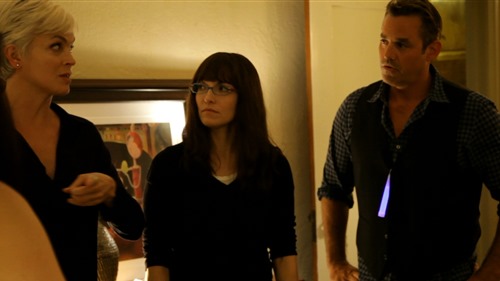Written by Katherine Murray.
Coherence is a triumph of low-budget filmmaking, a reality show about an extreme acting challenge, a disturbing science fiction take on human nature and identity, a fascinating puzzle box, and a movie with a well-written, well-acted female lead. Bet you wish you’d seen it, now.

It’s awfully hard to talk about Coherence without wrecking all of the surprises in the story – even the central conceit is secret that’s buried until you’re well into the film. Without giving away too much more than the trailer, the story is about a group of friends at a dinner party where really weird shit starts to happen. There’s a comet passing overhead, and – we are told – the last time this comet passed by, people got confused about who they were, and where they were, and what was going on.
During the dinner party, cell phone service goes down, and the power goes out. Two of the characters walk to a house two blocks over, which seems to have power, to ask if they can use a landline phone. When they get back, they’re visibly shaken and don’t want to share what they’ve seen.
From that point forward, everything starts to get weird. People act strangely; they repeat themselves; events seem to happen out of order; the characters discover a box that seems like it shouldn’t exist. As they try to piece together what’s happening, and what they should do to survive, the stress of the situation puts pressure on their relationships, and the darker sides of their personalities come to the surface.
The explanation of what’s happening, when we get it, is internally consistent with everything we’ve seen – and the finale is disturbing, but eerily believable. It’s a movie you have to watch twice – once for the experience of suspense and confusion, and once for the experience of piecing all the clues together, and seeing how carefully plotted each event was. It’s the kind of awesome, well-made film that grabs you right away, makes you want to find out more, and then delivers on its promises in the final act.

Although this isn’t clear at first, the protagonist of Coherence is Emily (played by Emily Foxler), a dancer who regrets the trajectory her career path has taken. Without giving too much away, it’s fair to say that the film follows her from beginning to end, and that she’s the character who’s forced to make a choice in the final moments – about who she wants to be, what she wants to have, and what she’s willing to do to get it.
The second most important character, from a narrative standpoint, is Mike – played by Nicholas Brendon as an exaggerated version of himself (spoilers in the link). Mike is the former star of a cult-hit TV show and doesn’t like who he turns into when he’s drinking. He goes dark as soon as things start to get strange, exhibiting a mix of paranoia and self-hatred, followed by radical, destructive behaviour. Eventually, he starts drinking again, much to the others’ dismay.
By the end of the film, it’s clear that Mike’s story exists to prepare the audience for the choices that Emily’s going to face later on. The dark side of his personality is so close to the surface that it comes spilling out right away, priming us to look for signs of darkness in the other characters. He also states one of the movie’s biggest themes during a small, self-pitying speech, but I can’t tell you, here, what it is.
The reason I bring this all up – in annoyingly cryptic terms – is just to say that, in a lot of ways, Coherence is one of the movies I wished for when I wrote about how big idea movies usually don’t have female leads. This is a story about selfhood and the way we understand ourselves as individuals, in very broad, universal terms, and we’re invited to follow and identify with a woman as the centre of that story.
Also – perhaps because this is a dinner party made up of heterosexual couples – half of the characters in this movie are women. I notice that, in general, the male characters are more action-oriented and push the story forward through doing things, whereas the women tend to push the story forward by talking about and discovering things, but I don’t think that’s necessarily bad. If Emily weren’t the central character, then the way that men seem to make all the really explosive decisions would be more annoying, but, since the story comes back to her in the end, the whole thing feels more balanced.

The other really cool thing about Coherence, and the reason I recommend watching it, is that, in addition to telling a good, suspenseful, interesting story, this movie is also a reality show about acting. Writer/director James Ward Byrkit, and one of the actors, Alex Manugian, spent a year plotting the story before filming it in Byrkit’s home. Manugian was the only actor who knew the whole plot – the others were given notes every day, explaining background information that their characters would have, talking points that they should try to hit in group discussions, and what their motivations were at present. They then had to improvise their way through each scene, working together to tell a story that only one of them knew, trying to stay in character while it was happening.
Not to sound like I normally overlook acting, but this is the kind of movie that reminds you of what actors actually do, and of the skill, self-control, and self-awareness required to do it.
I’m sure that good editing plays a role in making Coherence look seamless, but there’s still something really exciting about watching eight people (seven, if you don’t count Alex Manugian) dive into an acting experiment and just try to do their jobs. Knowing how the film was made, and then watching it play out on screen, I’m reminded that acting is about collaboration – in every scene, each of these actors has to split their attention between hitting the marks set out before them, and helping the others do the same – in this case, without knowing ahead of time what’s actually going to happen. And while all of that’s going on behind the scenes, inside their heads, they have to make it look like it’s just natural, and like they’re the people they’ve been cast to play.
Coherence, for me, involves that sense of pleasure that comes from watching people who are good at something do that thing well. It also makes me wonder what other cool things actors could do, if there were more experiments like this.
When you put it all together, you’ve got an interesting, suspenseful, tightly-plotted movie about identity, starring a female protagonist, full of good acting and editing. There is absolutely no reason you would not want to watch this, so go watch it now.
Katherine Murray is a Toronto-based writer who yells about movies and TV on her blog.

This sounds awesome! I love mystery films like this, and the way you described how it was filmed reminds me of the filmmaker Mike Leigh and how he does his films.
I read the first paragraph, watched the film and came back to finish reading the review. It’s just so good. It’s good writing, directing, editing, acting, and it’s an awesome, low-key, sci-fi story (kind of like “The one I love”, a film I totally recommend, by the way).